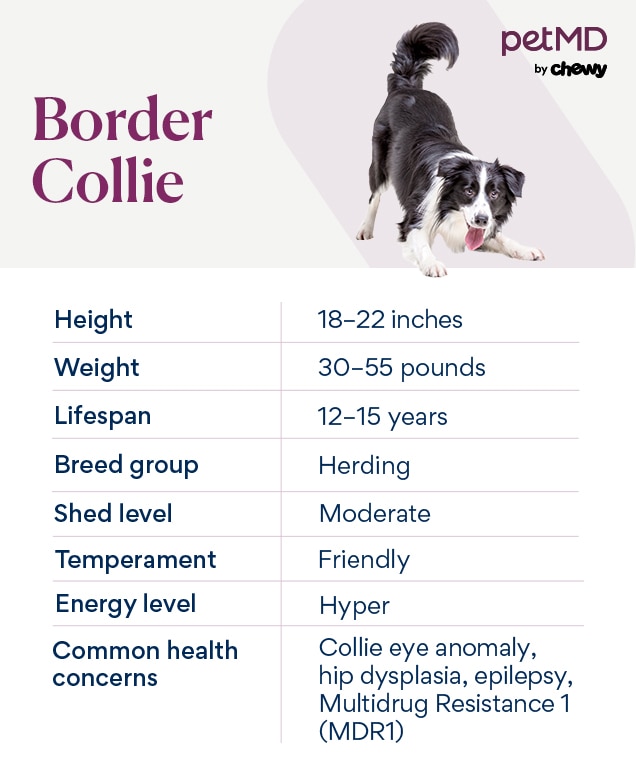You should feed a Border Collie puppy three to four times a day. Their growing bodies need consistent nourishment to support their energy and development.
Border Collie puppies are full of energy and curiosity. To keep them healthy, it’s important to feed them properly. A good feeding schedule is essential for their growth. Knowing how often to feed them helps in building strong bones and muscles.
It also ensures they have the energy to play and learn. As they grow, their feeding needs change. Understanding these needs can make a big difference in their health. In this guide, we will explore the best feeding practices for your Border Collie puppy. Learn how to keep your furry friend happy and thriving with the right feeding routine.
Feeding Schedule
A proper feeding schedule is crucial for a Border Collie puppy’s growth. Puppies need specific nutrients and consistent meal times to stay healthy. Understanding how often to feed them can set the foundation for a happy, healthy dog.
Daily Frequency
Border Collie puppies need frequent meals. Feed them four times a day. This helps maintain their energy levels. Smaller, regular meals prevent overeating. It also aids in proper digestion. Consistent feeding times help create a routine. This makes training easier and promotes good behavior.
Age-based Adjustments
As your Border Collie puppy grows, adjust their feeding schedule. From 8 to 12 weeks, feed four times daily. From 3 to 6 months, reduce it to three meals a day. After 6 months, you can switch to twice a day. Always consult your vet for specific advice. Each puppy is unique and may need different adjustments.
Nutritional Needs
Feeding a Border Collie puppy can be challenging. Their nutritional needs are specific and crucial for healthy growth. Knowing what to feed and how much is key to their development. In this section, we will explore the essential nutrients and portion sizes needed for Border Collie puppies.
Essential Nutrients
Border Collie puppies need a balanced diet. This includes proteins, fats, carbohydrates, vitamins, and minerals.
- Proteins: Essential for muscle growth. Look for high-quality sources like chicken, beef, or fish.
- Fats: Provide energy. Omega-3 and Omega-6 fatty acids are great for skin and coat health.
- Carbohydrates: Offer energy and aid digestion. Choose whole grains and vegetables.
- Vitamins: Support overall health. Vitamin A, D, E, and B-complex are crucial.
- Minerals: Important for bone development and metabolic functions. Calcium and phosphorus are key.
Portion Sizes
Portion sizes depend on the puppy’s age and weight. Generally, puppies need more food than adults. Below is a table to guide you:
| Age (Months) | Daily Meals | Portion Size (Cups per Meal) |
|---|---|---|
| 2-4 | 4 | 0.5 – 1 |
| 4-6 | 3 | 1 – 1.5 |
| 6-12 | 2 | 1.5 – 2 |
Always monitor your puppy’s weight and adjust portions as needed. Puppies grow quickly and their needs change.
Remember to provide fresh water at all times. A well-hydrated puppy is a healthy puppy.
Choosing The Right Food
Feeding your Border Collie puppy the right food is crucial. It affects their growth and overall health. Puppies need a balanced diet for proper development. Selecting the right type of food can be confusing. Let’s explore the options available.
Wet Vs Dry Food
Wet food is usually more palatable for puppies. It has a high moisture content, which helps with hydration. However, it can be more expensive and has a shorter shelf life. Dry food is convenient and lasts longer. It also helps in keeping the puppy’s teeth clean. The choice between wet and dry food depends on your puppy’s needs and your convenience.
Commercial Vs Homemade
Commercial puppy food is formulated to meet all nutritional needs. It is convenient and ensures a balanced diet. Homemade food can be customized to your puppy’s preferences. But it requires careful planning to ensure all nutrients are included. Consult a vet before choosing homemade food to avoid nutritional deficiencies.

Credit: www.burgesspetcare.com
Feeding Tips
Feeding a Border Collie puppy requires careful planning and attention. These energetic and intelligent puppies need a balanced diet for growth and development. Let’s explore some essential feeding tips to ensure your puppy stays healthy and happy.
Establishing Routine
Creating a feeding schedule is crucial for your Border Collie puppy. Consistent meal times help regulate their digestion and provide structure. Start by feeding your puppy three to four times a day. As they grow, you can reduce it to two meals a day.
Here is a simple feeding schedule:
| Age | Meals per Day |
|---|---|
| 8-12 weeks | 4 meals |
| 3-6 months | 3 meals |
| 6-12 months | 2 meals |
Monitoring Growth
Regularly monitor your puppy’s growth to ensure they are getting enough food. Weigh them weekly and compare with a Border Collie growth chart. Consult your vet if their weight is not within the normal range.
Consider the following points:
- Check their body condition score.
- Feel their ribs. They should be covered with a slight layer of fat.
- Observe their energy levels and coat condition.
Adjust the food quantity if needed, based on their growth and activity levels. Puppies need more calories than adults, so ensure their diet is rich in nutrients.
Common Feeding Mistakes
Feeding a Border Collie puppy correctly is crucial for its growth and health. Yet, many owners make common feeding mistakes. These errors can lead to health issues and behavior problems. Let’s explore two common mistakes: overfeeding and inconsistent timing.
Overfeeding
Many owners overfeed their puppies. They think more food means a healthier puppy. This is not true. Overfeeding can cause obesity and joint problems. A chubby puppy might look cute, but it’s unhealthy. Follow the vet’s advice on portion sizes. Stick to the recommended amount to ensure a healthy weight.
Inconsistent Timing
Feeding your puppy at inconsistent times can confuse them. Puppies need a routine to feel secure. Set regular feeding times and stick to them. A consistent schedule helps with digestion and potty training. It also prevents begging and food aggression. Regularity is key to a happy, healthy puppy.

Credit: www.petmd.com
Special Dietary Considerations
Feeding a Border Collie puppy requires special attention to their diet. Puppies have unique needs due to their rapid growth and active nature. Ensuring they receive the right nutrients can help them grow strong and healthy.
Allergies
Some Border Collie puppies are prone to food allergies. Common allergens include:
- Chicken
- Beef
- Dairy
- Wheat
- Soy
Signs of allergies can include:
- Itchy skin
- Red, inflamed ears
- Digestive issues
If you suspect your puppy has an allergy, consult your vet. They might recommend an elimination diet. This involves removing common allergens one by one to identify the culprit.
Sensitive Stomachs
Some puppies have sensitive stomachs. They might struggle with certain foods. Symptoms can include:
- Diarrhea
- Vomiting
- Gas
For puppies with sensitive stomachs, consider feeding:
- Limited ingredient diets
- Grain-free options
- Hypoallergenic formulas
Always introduce new foods slowly. This helps avoid upset stomachs. Start by mixing a small amount of new food with their current food. Gradually increase the new food over a week.
Consult your vet for personalized advice. They can suggest the best food options for your Border Collie puppy’s specific needs.
Transitioning To Adult Food
Transitioning your Border Collie puppy to adult food is an important step. It ensures they get the right nutrients as they grow. But when should you start, and how do you do it gradually? Let’s dive in and explore these key questions.
When To Start
Begin transitioning your Border Collie puppy to adult food at about 12 months. This is when most puppies become adults. Larger Border Collies may need a few extra months. Always consult your vet for the best timing.
Gradual Changes
Make the transition gradual to avoid upsetting your puppy’s stomach. Start by mixing adult food with their puppy food. Use a ratio of 25% adult food to 75% puppy food. Do this for a few days.
Next, increase the adult food to 50%. Keep this mix for another few days. If your puppy seems fine, move to 75% adult food. Finally, switch to 100% adult food. Monitor your puppy during this process. Look for any signs of digestive issues. If you notice any problems, slow the transition process down.
Consulting A Veterinarian
Feeding a Border Collie puppy correctly is crucial for their growth. Consulting a veterinarian ensures you’re on the right track. Vets provide expert advice tailored to your puppy’s needs. These professionals offer valuable insights that can help your puppy thrive.
Regular Checkups
Regular checkups are important. Schedule visits with your vet every few months. This helps monitor your puppy’s growth. Vets check weight, overall health, and development. They can spot any issues early. Early detection of problems makes treatment easier.
Customized Feeding Plans
Every puppy is unique. A vet can create customized feeding plans. These plans consider your puppy’s breed, age, and health. They provide specific guidelines on meal sizes and frequency. This ensures your Border Collie gets the right nutrition.
- Breed-specific needs
- Age-appropriate portions
- Health considerations
Follow the vet’s advice for the best results. Your puppy will be happy and healthy.

Credit: zigzag.dog
Frequently Asked Questions
How Many Times A Day To Feed A Border Collie Puppy?
A Border Collie puppy should be fed three to four times a day. This helps support their rapid growth and energy needs.
What Should I Feed My Border Collie Puppy?
Feed your Border Collie puppy high-quality, balanced puppy food. Ensure it meets the nutritional requirements for their growth and development.
Can I Give Treats To My Border Collie Puppy?
Yes, you can give treats, but do so sparingly. Treats should not exceed 10% of their daily caloric intake.
Should I Follow A Feeding Schedule For My Puppy?
Yes, maintaining a consistent feeding schedule helps regulate their digestion. It also establishes a routine for your puppy.
Conclusion
Feeding your Border Collie puppy correctly is essential. Start with small, frequent meals. Gradually increase portions as they grow. Healthy, balanced diets support growth and energy. Monitor weight and adjust food as needed. Consult your vet for personalized advice. Proper feeding habits lead to a happy, healthy puppy.
Pay attention to their needs and changes. Consistency is key in their diet. Enjoy the journey of raising your Border Collie.
